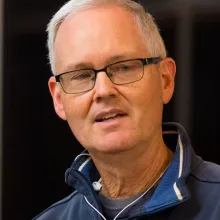God Gets There First—Detective Witnesses & Finding Open Doors

A kindly man in my neighborhood, Gene, hadn’t spoken to me, nor I to him, in 25 years. This isn’t due to any animosity I’m aware of but, most likely, just due to simple neglect.
Recently, things changed. Gene traversed the vast chasm separating us—our back alley—to tell me that his van had been stolen by brazen thieves in broad daylight. And our conversation went from there.
Within 10 minutes, we were engaged in some friendly banter about God and church.
That’s a pretty quick transition, especially after a quarter century of silence. Admittedly, I’m pretty handy in bringing up faith in conversation—not to manipulate or impose but simply to obey Jesus’ command to share the gospel (Matt 28:19–20).
But this wasn’t my doing. Rather, it was God who opened a door, an example of a principle I believe with all my heart: God goes before us in witness.
God gets there first. He’s at work before we ever arrive on the scene. And that makes us, Christian witnesses, detectives and investigators of sorts.
Our first job in witnessing (after prayer) is to discover what God is doing in the other person then dive in. In Reimagining Evangelism, Rick Richardson writes, “We are junior partners in the Holy Spirit Detective Agency. We look for clues . . . [We ask] ‘Where is God already at work?’” (p. 37).
From Salesmanship to Discovery
This type of God-centered witness gets us out of the business of salesmanship and into the adventure of discovery and discernment. We don’t bring Jesus to people—he’s already there, crafting, wooing, softening, making, and remaking. Our job is to prayerfully find and enter the open door, which usually involves some little risk on our part.
I have the great privilege of serving as an evangelism coach for Aliya, a graduate student in Chicago, who recently took this risk. She’s way different than me, focusing on a few individuals while I scatter seed widely. I think of her as a “wise counselor” evangelist. Aliya possesses keen insight into people’s lives. They seek her out, and she responds with gospel-centered wisdom.
Even though people come to Aliya for advice, she still has to take the risk of initiating relationships, making herself available, and bringing up spiritual matters. That’s the hard part for Aliya, being an introvert.
But the knowledge that God is already at work in her friends’ lives gives Aliya the confidence to take risks. Her latest was to move an ongoing conversation with a non-Christian friend from the topics of relationships, career, and COVID-19 to a Bible study. As a spiritual detective, Aliya had discerned an openness in her friend to take this step.
So Aliya, the wise counselor evangelist, is now helping her friend discover the wise counsel of Jesus. This gives me great hope that whether you’re a farmer-sower like me or a focused-wisdom person like Aliya—or anything in between—God can use you in witness.
Tips on Being a Detective Witness
Pray for Openings
In Colossians 4:3, Paul asks for prayer “that God may open a door for our message.” Ask God to make a way for conversations with your friends.
Bring up Religious Topics
See how people respond when you mention topics like church, Christian holidays, prayer, hypocrisy in the church, the Bible, etc. If they are neutral or open, take it as a sign to keep going with that conversation.
Ask Questions, Share Yourself
Early in relationships, ask surface questions about hobbies, work, family, and sports. As the relationship develops, ask more probing questions about values, upbringing, politics, education, and religious beliefs. You’re not trying to pry or corner anyone but rather discover a person’s created self, who God made him or her to be.
As important as questions are, they need to be balanced with self-disclosure to avoid becoming an interrogation. For example, I may ask a new friend, “Do you have any church or religious background?” Then I’ll share my background before asking the next question.
Listen in Stereo
When talking with a friend, listen carefully to the person (a lost art in modern culture) and listen simultaneously to the Holy Spirit. Ask silently, “Lord, what do you want me to say right now? How are you working in this conversation?”
Use Humor
The topics of spirituality and religion need not be weighty and overly serious, especially early on. At the golf course where I play, I have a few go-to one-liners that lighten the topic of religion and make it safe for everyone to talk about. This often leads my partners to talk about religion all the more—perhaps nettling me a bit (I love it . . . can’t take myself too seriously)—informing my research about their willingness to talk about spiritual matters. Then later I can be more serious: “How’s your wife’s recovery from surgery going? I’d like to pray for her.“
In all these things, remember that Jesus gets there first. You don’t have to bring him to the next conversation. You don’t have to be a gospel salesperson. Jesus is already talking to your non-Christian friends and invites you to uncover how he’s at work and to join the conversation.







